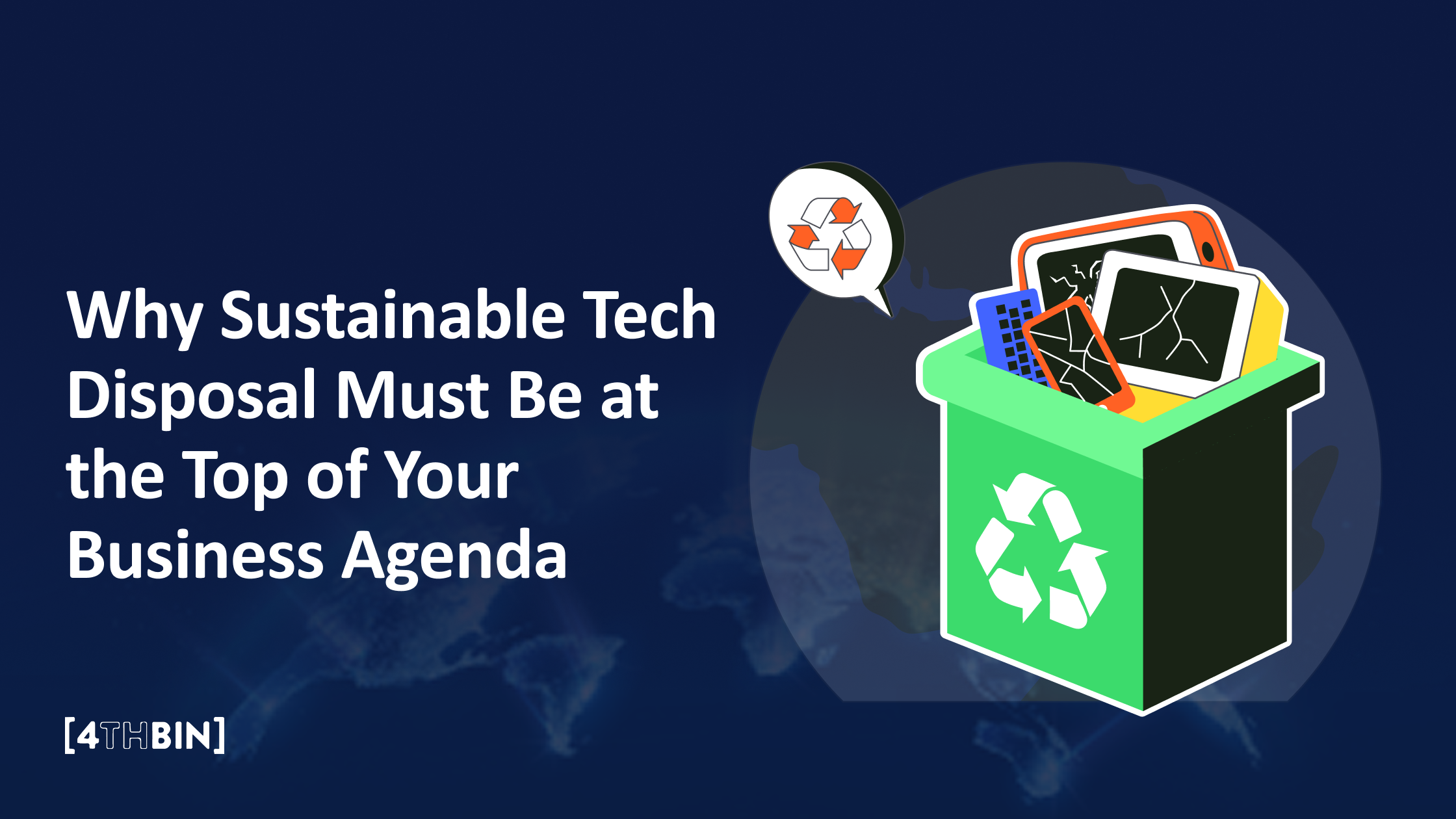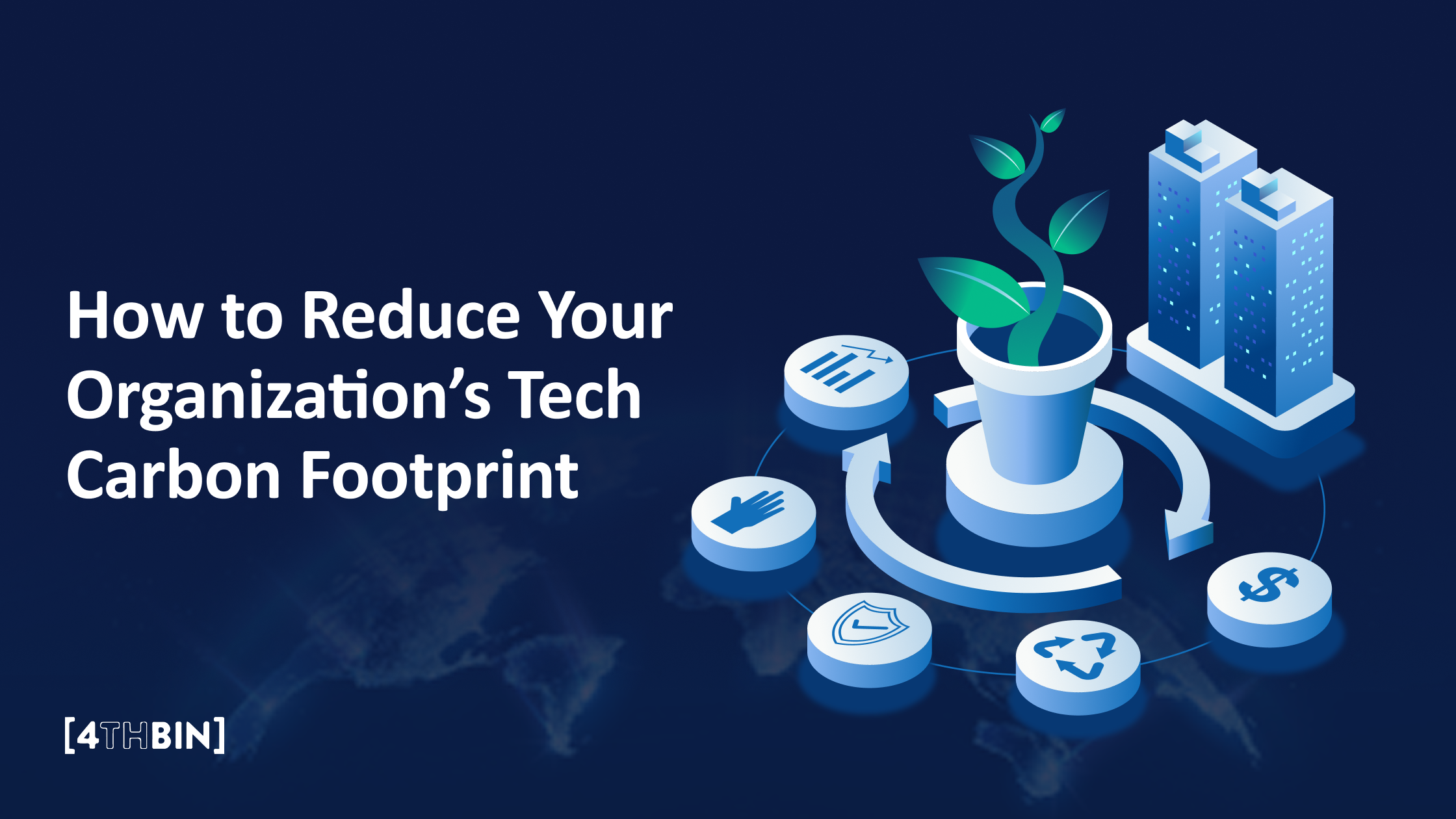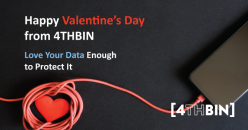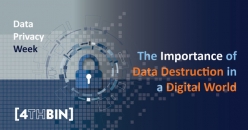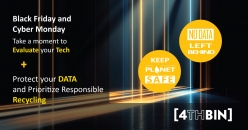How to Dispose of Electronics in New York City (NYC)?
Do you reside in New York City and wonder how to dispose of your old electronics? Whether it’s a laptop that no longer powers on, a smartphone that’s been replaced, or a TV that’s seen better days, figuring out what to do with unwanted electronics can be tricky.
Every year, NYC collects around 25,000 tons of electronic waste. Some of it is recycled, but much still ends up in landfills or burned in the Newark Incinerator, releasing pollutants into the air we breathe.
The good news is that recycling electronics in NYC is easier than you might think. In fact, New Yorkers are already making an impact. E-waste programs in NYC have diverted an average of 2.2 tons of electronics per day, out of which 24.4 tons of electronics and 0.1 tons of rechargeable batteries were recycled.
So, if you’ve got outdated electronics taking up space, it’s time to clear them out the right way. In this blog, we will explore what you can recycle, where to take it, and how to dispose of your electronics in NYC so that you can contribute to a cleaner, greener city.
Types of E-Waste That Can Be Recycled in NYC

Electronic waste, or e-waste, covers various devices and accessories that plug in or run on batteries. In NYC, the following items can be recycled:
- Computers and Accessories: This includes desktops, laptops, tablets, monitors, keyboards, mice, external hard drives, and cables.
- Home Entertainment Equipment: TVs, DVD players, Blu-ray players, stereos, gaming consoles, and remote controls.
- Mobile Devices: Smartphones, cell phones, tablets, and their chargers.
- Printers and Imaging Equipment: Printers, scanners, fax machines, and copiers.
- Small Electronics: Digital cameras, MP3 players, GPS devices, and handheld gaming devices.
However, not every electronic item qualifies for standard recycling programs. Let’s explore electronics, which are exceptions and cannot be recycled as e-waste.
What You Cannot Recycle as E-Waste
While NYC offers comprehensive recycling programs, certain items are prohibited from recycling as standard e-waste due to safety or environmental regulations. According to the NYS Electronic Equipment Recycling and Reuse Act and NYC sanitation guidelines, the following items cannot be recycled through e-waste programs:
- Large Appliances: Refrigerators, ovens, dishwashers, air conditioners, washing machines, and dryers are classified as bulk items and must be disposed of through designated bulk collection services.
- Batteries: Lithium-ion, rechargeable, and lead-acid batteries are not accepted in regular e-waste recycling. They must be taken to designated battery recycling locations. Alkaline batteries can be disposed of with regular household trash.
- Light Bulbs: Fluorescent bulbs, compact fluorescent lamps (CFLs), and other mercury-containing bulbs require special disposal through hazardous waste programs.
- Smoke Detectors: Due to their radioactive components, smoke detectors must be returned to the manufacturer or disposed of according to specific safety guidelines.
- Medical Devices: Electronics such as pacemakers, hearing aids, and other medical equipment cannot be recycled through standard programs.
- Hazardous Electronics: Devices that contain hazardous chemicals or pressurized gases, such as aerosol products and propane tanks, are not accepted.
Can You Dispose Your E-Waste with Regular Trash in NYC?
Throwing your old electronics in the trash might seem like the easiest option, but in New York City, it’s actually against the law. Under the Disposal Ban, residents are prohibited from disposing of electronics with regular household garbage or curbside recycling. This rule helps prevent harmful materials like lead, mercury, and cadmium from ending up in landfills, where they can damage the environment and impact public health.
You could face a fine if you’re caught tossing electronics in the trash. The amount depends on the type and quantity of items, so it’s best to avoid the risk altogether.
For items that don’t fall under standard e-waste recycling—like large appliances, batteries, and light bulbs— it is always better to refer to the NYC Department of Sanitation website for proper disposal methods. This ensures both legal compliance and environmentally responsible waste management.
How to Dispose of Electronics in NYC?
Fortunately, New York City offers several convenient ways to recycle electronics. Whether you prefer a drop-off location or a manufacturer takeback program, you have plenty of choices.
Manufacturer Takeback Programs
Many electronics manufacturers and retailers provide free recycling services, making it easy to dispose of old devices responsibly. These programs often accept various electronics, including computers, TVs, and mobile phones. Some companies offer mail-back options, while others allow in-person drop-offs at retail locations.
- Apple: Apple’s trade-in program accepts iPhones, iPads, Macs, and other devices. You may receive credit toward a new purchase if your device is eligible. Otherwise, Apple will recycle it for free.
- Dell: Dell’s recycling program accepts old computers and accessories, even if they’re not Dell-branded. You can print a free shipping label and send your devices via mail.
- HP: HP offers a mail-back recycling service for computers, printers, and accessories. Businesses and individuals can use this program to dispose of old electronics safely.
- Best Buy: Best Buy stores accept electronics of all brands, regardless of where they were purchased. Most items are accepted for free, although there may be a small fee for specific products like TVs and monitors. Check your local store for specific guidelines.
- Staples: Staples accepts electronics such as laptops, desktops, printers, and mobile phones. Small electronics like keyboards and mice can also be dropped off at most locations. However, some stores may limit the number of items you recycle per visit, so it’s a good idea to call ahead.
Before using a takeback program, visit the company’s website to confirm accepted items and any restrictions. Many programs also offer incentives such as store credit or discounts on new purchases, making recycling environmentally and financially beneficial.
eCycleNYC Program
If you live in an apartment building with 10 or more units, you may have access to the eCycleNYC program. This partnership between the NYC Department of Sanitation and Electronic Recyclers International makes recycling electronics easy and convenient.
Residents can drop off unwanted electronics in designated collection bins within the building. Accepted items include computers, TVs, printers, and mobile phones. The NYC Department of Sanitation collects the electronics and ensures they are recycled responsibly, following all state and local regulations.
The eCycleNYC program is available to buildings throughout the five boroughs. If your building isn’t enrolled, encourage your property manager to sign up. It’s a simple way to ensure that electronics are recycled properly without the hassle of transporting them yourself.
SAFE Disposal Events
NYC’s SAFE Disposal Events offer an excellent option for those who prefer event-based recycling. These events, held periodically in each borough, provide residents with a one-stop solution for recycling electronics and other hazardous household items.
At SAFE Disposal Events, you can drop off various items, including electronics like computers, TVs, printers, mobile phones, and gaming consoles. They also accept hazardous items such as batteries, light bulbs, paints, solvents, automotive products, and other household waste like aerosols, pesticides, and cleaning products.
Check the NYC Department of Sanitation website for upcoming event dates and locations to participate in a SAFE Disposal Event. These events are typically scheduled in the spring and fall. Before heading to the event, securely pack your electronics and hazardous waste, ensuring all items are intact and leak-free.
Once you’re ready, simply drive or walk to the designated drop-off site, where event staff will collect your items quickly and free of charge. Remember that these events are open to NYC residents only, so be sure to bring proof of residency, such as a driver’s license or utility bill. It is also important to note that businesses are prohibited from using these events and must arrange for commercial recycling services instead.
Local Drop-Off Locations
If you prefer a year-round option, you can recycle electronics at local drop-off locations throughout the city. Many retailers participate in recycling programs, accepting a wide range of items regardless of where they were purchased.
When using a drop-off location, always check the store’s website or call ahead to confirm accepted items, fees, and drop-off procedures. Some locations may have seasonal restrictions or temporary suspensions due to space limitations.
Donate Electronics for Reuse
If your electronics are still in good working condition, donating them is a great way to reduce waste and help others. Many organizations accept used electronics and refurbish them for individuals, schools, and nonprofits that need affordable technology.
- Goodwill: Most locations accept computers, laptops, mobile phones, and small electronics. Donated items are resold in Goodwill stores or refurbished for community programs.
- The Salvation Army: The Salvation Army accepts electronics in working condition, including computers, TVs, and gaming consoles. Proceeds from sales support local social services.
- Local Schools and Community Centers: Many schools, libraries, and community centers welcome donations of computers and tablets for educational use. Contact local organizations directly to see what they need.
- Online Platforms: Websites like Freecycle, Craigslist, and Facebook Marketplace allow you to give away electronics to people in your area. This is a quick and easy way to pass along items that still have life left in them.
Before donating, wipe all personal data from devices using secure data-destruction software. This protects your privacy and ensures the recipient can use the device without issues. Also, check each organization’s website for accepted items and drop-off instructions, as policies vary.
How Can You Reduce E-Waste?
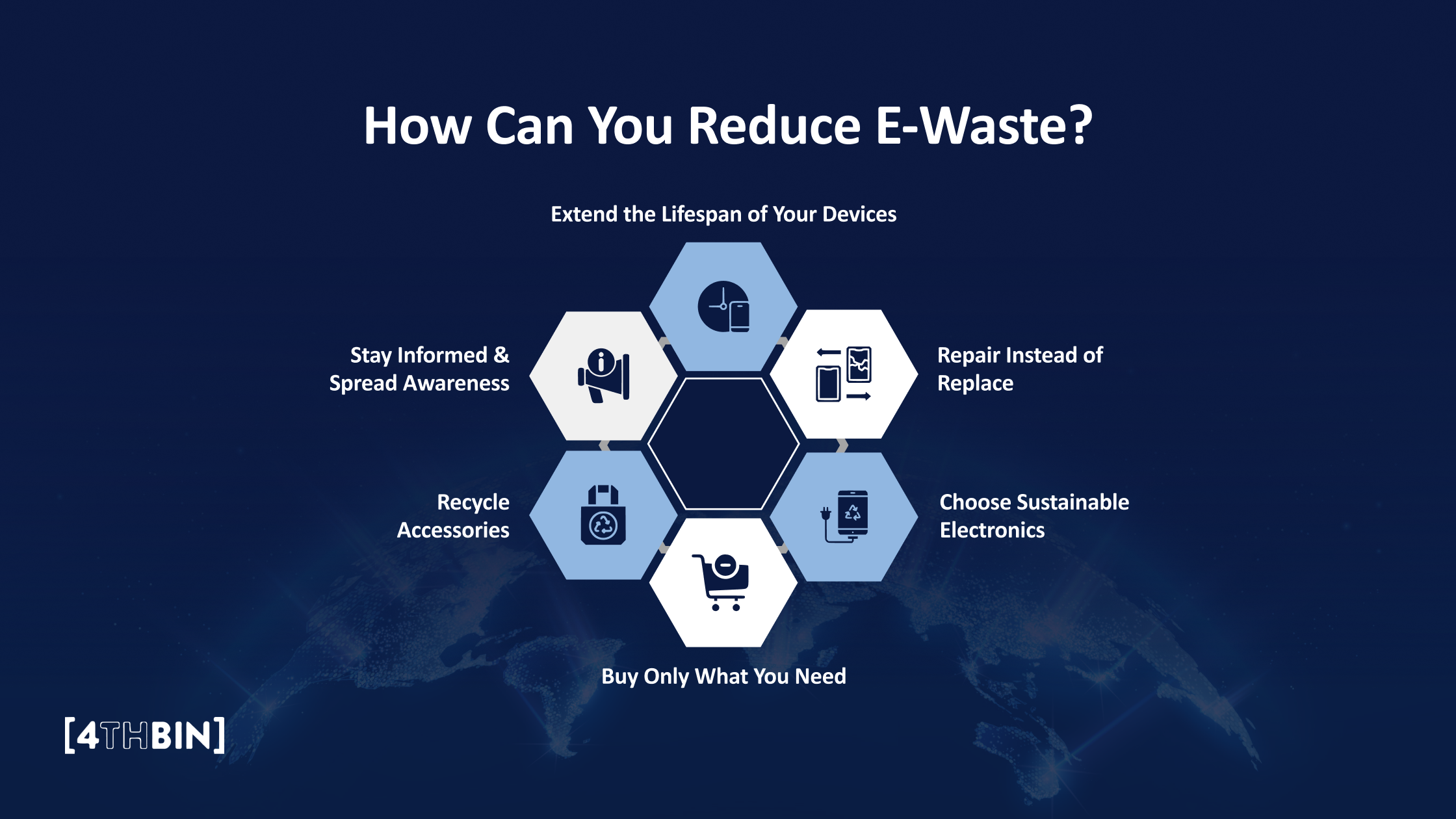
Reducing e-waste starts with making smarter choices about using, maintaining, and disposing of electronics. Here are some practical tips to help you reduce e-waste:
Extend the Lifespan of Your Devices
Protect your electronics with sturdy cases, screen protectors, and surge protectors to prevent damage. Avoid overcharging devices, as it can degrade battery life. Regular software updates and proper maintenance can also keep your devices running efficiently for longer.
Repair Instead of Replace
When a device breaks, consider repairing it instead of buying a new one. Many electronics can be fixed with affordable replacement parts, reducing waste and saving money. Check if the manufacturer or a local repair shop offers repair services.
Choose Sustainable Electronics
Opt for energy-efficient devices with longer lifespans. Look for products with certifications like ENERGY STAR, which indicates lower energy consumption. Support brands that offer repair services, recycling programs, and eco-friendly designs that are easy to upgrade and disassemble.
Buy Only What You Need
Avoid purchasing electronics you don’t truly need. Think carefully before upgrading to the latest model, as older devices work perfectly fine for everyday use. You can consider donating or reselling a device if you no longer need it. This extends the life of electronics, reduces demand for new products, and conserves resources.
Recycle Accessories
Don’t forget about chargers, cables, and accessories. Many recycling programs accept these items, preventing them from ending in landfills. Some retailers, like Best Buy and Staples, have dedicated bins for small electronics and accessories.
Stay Informed & Spread Awareness
Educate yourself and others about the importance of reducing e-waste. Encourage friends, family, and colleagues to adopt sustainable electronics practices. Supporting legislation and companies prioritizing sustainability can also help drive more significant systemic change.
These habits can reduce e-waste, conserve resources, and create a more sustainable future.
How Businesses in NYC Should Handle E-Waste
Businesses in New York City often generate a significant volume of e-waste, including outdated computers, servers, networking equipment, and office electronics. Here’s how businesses can responsibly manage their e-waste in NYC:
Establish an E-Waste Management Plan
Businesses should implement an internal e-waste management plan to ensure that electronic devices are disposed of responsibly. This plan should include guidelines for identifying obsolete equipment, securely storing e-waste until collection, and coordinating with certified recyclers for scheduled pickups. Assigning a designated employee or team to oversee e-waste management can help maintain compliance and streamline recycling.
Ensure Data Security Before Recycling
Before recycling electronics, businesses must erase all sensitive data to protect their clients, employees, and proprietary information. This process involves using secure data-wiping software that meets industry standards. For devices that cannot be wiped due to hardware malfunctions, physically destroying hard drives and storage devices is recommended to ensure that data cannot be recovered. Many certified recyclers offer on-site data destruction services, providing businesses with documentation and certificates of destruction for compliance purposes.
Maintain Records of E-Waste Disposal
Keeping detailed records of e-waste disposal is essential for compliance and auditing purposes. Businesses should retain documentation from recycling partners, including certificates of recycling and data destruction, to demonstrate that electronics were disposed of per regulations. These records can be valuable in the event of an inspection or audit.
Partner with Certified E-Waste Recyclers
Businesses must work with certified e-waste recycling companies that meet environmental and data security standards. Companies like 4THBIN specialize in collecting and recycling electronics from businesses of all sizes, including those undergoing large-scale IT upgrades or office relocations. Moreover, certified recyclers provide customized solutions such as bulk collection services, secure transportation, and asset disposition programs.
Choosing a recycler with R2v3 certification is crucial. This certification ensures that electronic devices are processed in an environmentally responsible manner, with strict protocols for handling hazardous materials and recycling components safely. Additionally, R2v3 certification guarantees that recyclers follow best practices for data destruction, helping businesses comply with data privacy regulations.
By partnering with certified e-waste recyclers and following best practices for data security and environmental responsibility, businesses in NYC can ensure regulatory compliance, protect sensitive information, and contribute to a more sustainable future.
Simplify E-Waste Recycling in NYC with 4THBIN
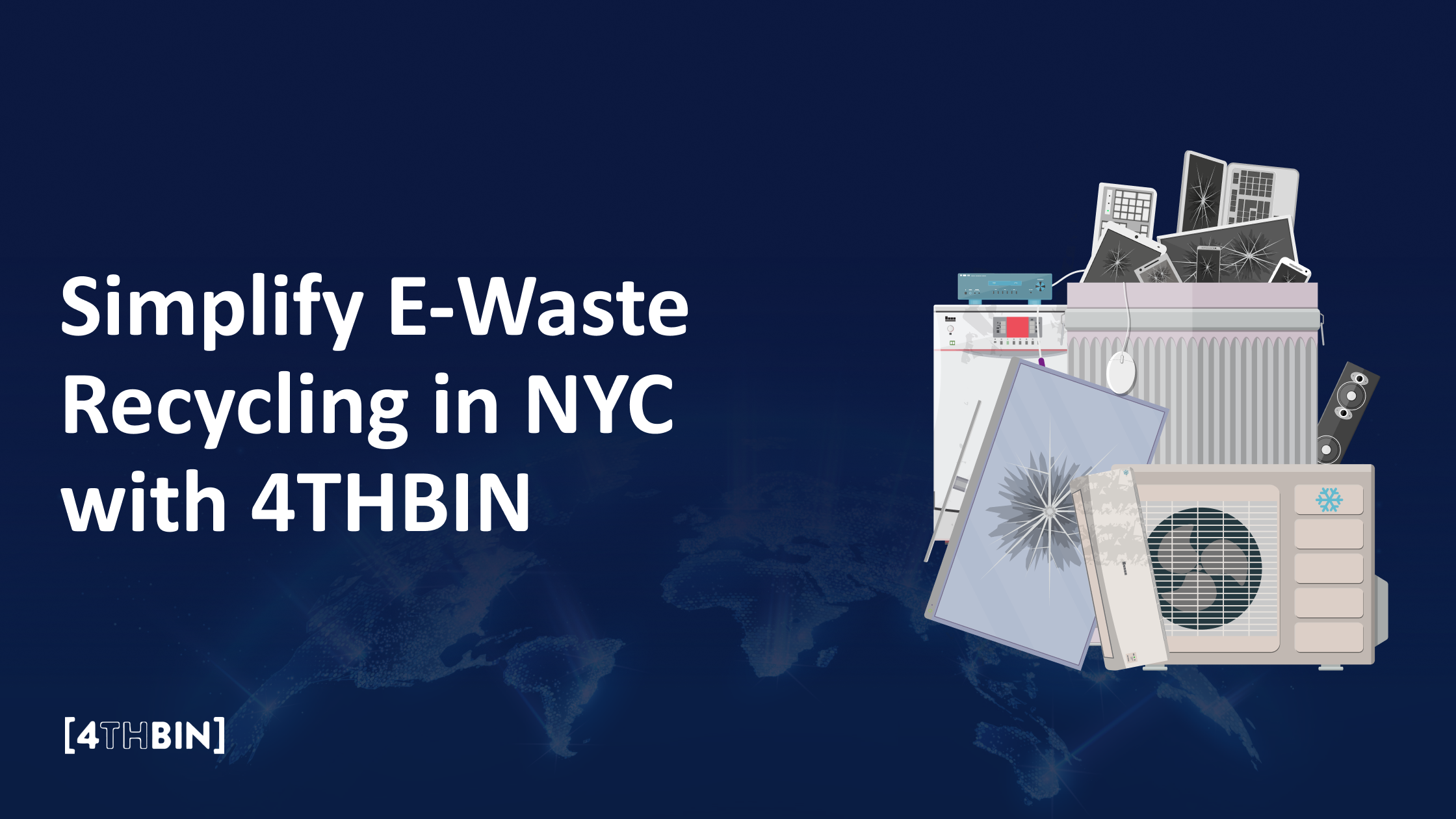
Choosing a certified recycler is essential for ensuring compliance with NYC regulations, protecting sensitive data, and minimizing environmental impact. With 4THBIN ’s e-recycling solutions, your organization can rest assured of secure, compliant, and environmentally responsible electronic waste disposal.
With over a decade of experience, 4THBIN has partnered with more than 10,000 organizations, including Fortune 100 companies and small businesses, to transform e-waste challenges into opportunities. We make the process seamless, offering businesses a way to turn a potential liability into an opportunity for leadership in sustainability and responsibility.
Our certified data destruction services ensure that sensitive information is completely safeguarded, eliminating the risks of data recovery associated with improper disposal. From secure RemoteReturn mail-in options to convenient on-site collection, our customizable solutions allow you to choose the plan that best suits your organization’s needs.
Create a cleaner, greener New York City.
Contact Us


